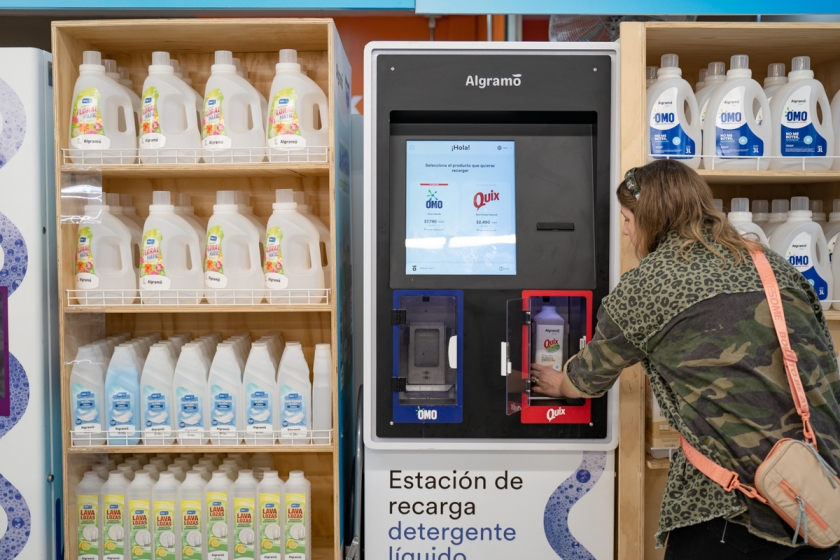
TPP to expand its activities to Saudi Arabia, UAE to promote innovative youth
The Potcast Productions Company (TPP), the leader in podcast production in the Middle East and ...

The launch of a service for reusable containers refill by the Chilean start-up Algramo can decrease the 430 million tons of plastic humanity produces a year, two-thirds of which are short-lived products that soon become waste.
Under the service, customers can bring reusable containers – each fitted with a unique RFID tag – to refill daily essentials such as shampoo, washing-up liquid and detergent. They can also order refills to their door and pay via a phone app.
Refill service like this is pivotal to addressing the plastic pollution crisis, experts say.
Crucially, the cost of Algramo’s products per gram is the same no matter how little or how much customers buy. Alleviating the “poverty tax,” which forces those with lower incomes to incur higher expenses for not buying in bulk, is the central goal of Chilean start-up Algramo – meaning “by the gram” in Spanish.
Companies such as Algramo, which was established in 2013, illustrate the economic benefits of tackling this issue and reimagining humanity’s relationship with plastic. As its founder and CEO José Manuel Moller has said, “People are deciding between their pocket or their planet, so we need to be cheaper and better.”
“Our customers pay for the packaging only on the first purchase,” says Algramo’s brand manager, Cristobal Undurraga. “This enables families to pay about 40 per cent less for life’s essentials due to the overprice that products in small formats usually have.”
According to Undurraga, among the biggest challenges the company faced was changing the way big companies treated plastic.
“Companies have set up their teams and their providers to work following a linear model, in which, after the product is sold, the packaging has no relevance to them,” he says. “We propose the opposite: once a product is sold, it is the company’s responsibility to keep that packaging in the economy and out of the environment, and we are here to help facilitate that transition.”
The company has expanded outside Chile; earlier this year, it tried its vending machines in a branch of Lidl in the West Midlands in the UK, allowing customers to refill four types of Lidl’s own-brand laundry detergent. Algramo is also tried vending machines in partnership with Nestle in Indonesia for its Milo and Koko Krunch products. The start-up has vending machines in New York and is preparing to enter the Mexican market.
While each market has its own challenges around plastic pollution, Undurraga said the issue needs a global response.
“Chile has more than 6,000 kilometers of coastline, so the pollution of our oceans is much more evident than in other countries, but (there are places) that are literally flooded by plastic because of the bad practices of global industries and governments. We have to face this as a global problem.”
Given that only 9 percent of plastic is recycled globally each year, reusing plastic containers is far preferable to putting them in the recycling bin.
“We need to stop believing in the fantasy that recycling is the solution for waste management,” Undurraga said.
“We are never going to be able to recycle the amount of plastic we are producing. If you really think about it, it’s absurd to collect plastic to recycle it in order to make another plastic and then all over again, instead of just reusing something over and over and over, and creating value and convenience,” Undurraga said.
Since 2020, Algramo customers have reused more than 900,000 pieces of packaging, equivalent to more than 100,000 kilograms of plastic that would have become waste. Consumer desire – and economic incentives – are there to revolutionize how we produce, consume and reuse our plastic products.
“The private sector has proved over and over that the environment is not above profits, so we need regulations to make them act. Governments (can play a huge role) in this,” Undurraga said. “We need carrots and sticks, incentives for companies that are doing well and the right penalties for companies that are not.”
The Potcast Productions Company (TPP), the leader in podcast production in the Middle East and ...
Minister of International Cooperation Rania Mashat urged the international community to expand innovative financing tools ...
More than a third (36%) of senior leaders in the financial services sector use generative ...


اترك تعليقا